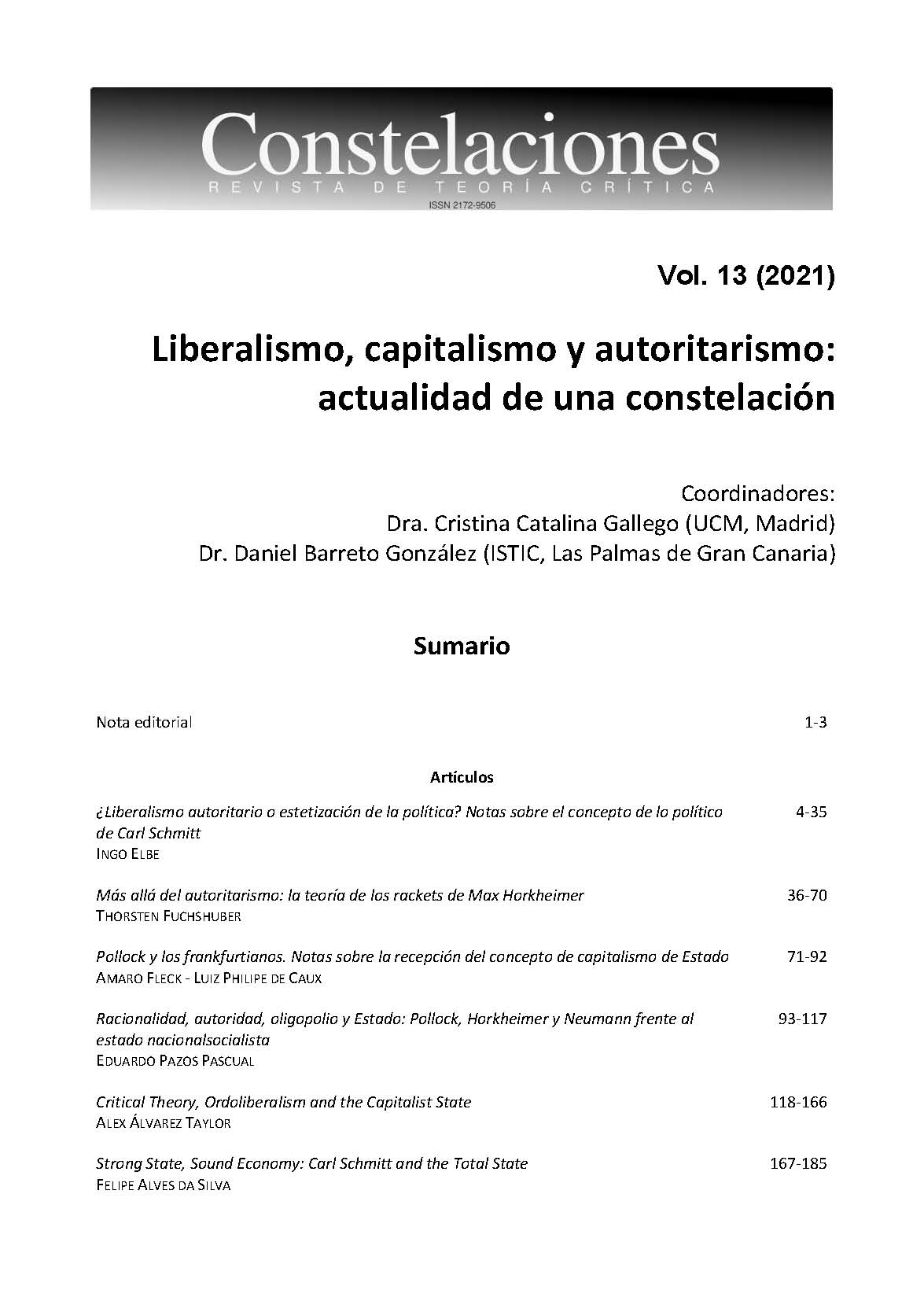Strong State, Sound Economy: Carl Schmitt and the Total State
Keywords:
totalitarian theory, liberal theory, fascismAbstract
Carl Schmitt’s concept of “total state” was formulated to describe the liberal state of the Weimar Republic that intervenes in all spheres of human life, overcoming the division between state and society. It is a total state by weakness since it is unable to curb social demands and to face the pluralism of interests of the political parties, which is followed by the subsequent bet on a real total state, called qualitative, thinking along the lines of the Italian fascist state: only a qualitative total state would be able to depoliticize society, overriding the interests of groups that seek to control the state, as a result, with non-intervention in the economy. Marcuse’s way to deal with this concept, using the term total-authoritarian state in reference to the qualitative total state, helps us comprehend the intimate relation between fascism and liberalism.
Downloads
References
BONEFELD, Werner (2016): Authoritarian Liberalism: from Schmitt via Ordoliberalism to the Euro, Critical Sociology, June 2016.
BONEFELD, Werner (2017a): Ordoliberalism and Political Theology: On the Government of Stateless Money. In: HIEN, J., JOERGES, C. (Eds.). Ordoliberalism, Law and the Rule of Economics, Portland, Hart Publishing.
BONEFELD, Werner (2017b): The Strong State and the Free Economy, London e New York, Rowman & Littlefield.
CHAMAYOU, Grégoire (2020): A sociedade ingovernável: uma genealogia do liberalismo autoritário, São Paulo, UBU.
CRISTI, Renato (1998): Carl Schmitt and Authoritarian Liberalism. Strong State, Free Economy, Cardiff, University of Wales Press.
HELLER, Hermann (2015): Authoritarian Liberalism? European Law Journal, v. 21, n. 3, may.
MARCUSE, Herbert (1965): Repressive Tolerance. In: WOLFF, Robert Paul; MOORE, Barrington; MARCUSE, Herbert. A Critique of Pure Tolerance, Boston, Beacon Press.
MARCUSE, Herbert (2009): The struggle against liberalism in the totalitarian view of the state. In: Negations, London, MayFlyBooks.
SAFATLE, Vladimir (2019): Dar corpo ao impossível: o sentido da dialética a partir de Theodor Adorno, Belo Horizonte, Autêntica.
SCHEUERMAN, William E. (1999): Carl Schmitt: the end of law, Maryland, Rowman & Littlefield.
SCHMITT, Carl (1940a): Die Wendung zum totalen Staat [1931]. In: Positionen und Begriffe im Kampf mit Weimar-Genf-Versailles (1923-1939), Hamburg, Hanseatische Verlagsanstalt Aktiengesellschaft.
SCHMITT, Carl (1940b): Weiterentwicklung des totalen Staats in Deutschland [1933]. In: Positionen und Begriffe im Kampf mit Weimar-Genf-Versailles (1923-1939), Hamburg, Hanseatische Verlagsanstalt Aktiengesellschaft.
SCHMITT, Carl (1979). Politische Theologie. Vier Kapitel zur Lehre von der Souveränität. Duncker & Humblot: Berlin.
SCHMITT, Carl (1985): Vorbemerkung. Über den Gegensatz von Parlamentarismus und Demokratie. In: Die geistesgeschichtliche Lage des heutigen Parlamentarismus, 6. Aufl., Berlin, Duncker und Humblot.
SCHMITT, Carl (1998): Strong state and sound economy: an address to business leaders. In: CRISTI, Renato, Carl Schmitt and Authoritarian Liberalism. Strong State, Free Economy, Cardiff, University of Wales Press.
VILLACAÑAS, José L. (2008): Poder y conflicto. Estudios sobre Carl Schmitt, Madrid, Biblioteca Nueva.
WOLIN, Richard (2006): The disoriented left: a critique of left schmittianism. In: The Frankfurt School Revisited: and other essays on politics and society, New York, Routledge.
Downloads
Published
How to Cite
Issue
Section
License
Copyright (c) 2021 Felipe Alves da Silva

This work is licensed under a Creative Commons Attribution-NonCommercial-ShareAlike 4.0 International License.
Authors who have publications with this journal accept the following terms:
1. Authors will retain their copyright and grant the journal the right of first publication of their work, which will be simultaneously subject to the License of recognition of Creative Commons CC BY-NC-SA 4.0 that allows third parties to share, redistribute and adapt the work provided it is for non-commercial purposes and its author and first publication in this journal is indicated.
2. Authors may adopt other non-exclusive distribution license agreements for the version of the published work (e.g., depositing it in an institutional electronic archive or publishing it in a monographic volume) provided that the initial publication in this journal is indicated.
3. Authors are permitted and encouraged to disseminate their work via the Internet (e.g., in institutional telematic archives or on their website) before and during the submission process, which can produce interesting exchanges and increase citations of the published work. (See The Effect of Open Access).
Data confidentiality
1. Constelaciones. Revista de Teoría Crítica guarantees that the data you send us will only be used to meet the requests made in this message.
2. Your data will not be passed on to third parties.
3. You may request that your data be removed from our records at any time.





